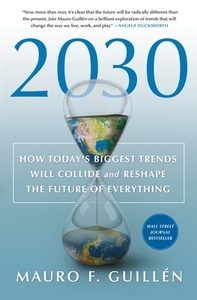Take a photo of a barcode or cover
42 reviews for:
2030: How Today's Biggest Trends Will Collide and Reshape the Future of Everything
Mauro F. Guillén
42 reviews for:
2030: How Today's Biggest Trends Will Collide and Reshape the Future of Everything
Mauro F. Guillén
The author does a very good job of taking trends and extrapolating them out for the next 10 years. He does hedge his bets by pointing out that no one can predict the future and these things “could” happen. Some of the items I can see might occur over the next 10 years but many others seem like he is condensing the time frame. Of course the author had no idea that the whole world would be shut down for at least one year as he was writing this due to a virus so the title of the book might be 2031. He does let the reader know that people, politics and large corporations could impact the direction things progress. Certainly, statistics and projections can easily be turned on their head by any one or all three of these groups. Having a certain type of government in the United States will have a huge impact on these predictions as well.
Over all this is a very eye opening and thought provoking book. His analysis of Africa and south east Asia are both very insightful. Of course politics and racial differences will play a major impact in Africa. I would recommend this book for anyone that’s just getting into business or starting a career or anyone that might be wanting to push their career to another level. The insights from this book will give many of these individuals the opportunity to think about other options that could be available for them if they adjusted their thought process and understood what these changes will mean to them and the world around us.
Over all this is a very eye opening and thought provoking book. His analysis of Africa and south east Asia are both very insightful. Of course politics and racial differences will play a major impact in Africa. I would recommend this book for anyone that’s just getting into business or starting a career or anyone that might be wanting to push their career to another level. The insights from this book will give many of these individuals the opportunity to think about other options that could be available for them if they adjusted their thought process and understood what these changes will mean to them and the world around us.
I received a copy of this book from the publisher in exchange for an honest review.

By 2030:
- There will be more grandparents than grandchildren
- The middle-class in Asia and Sub-Saharan Africa will outnumber the US and Europe combined
- The global economy will be driven by the non-Western consumer for the first time in modern history
- There will be more global wealth owned by women than men
- There will be more robots than workers
- There will be more computers than human brains
- There will be more currencies than countries
As a professor at the Wharton School, Mauro Guillén worries "not only about the future state of business but also about how workers and consumers might be affected by the avalanche of change coming our way." In 2030, he explains how several trends like wealth disparity (The U.S. federal poverty line in 2019 was $28,100 for a family of four, while, according to the UK House of Commons Library two-thirds of the world's wealth will be owned by the richest 1 percent in 2030), Africa's baby boom and industrial revolution, senior citizens postponing retirement, and the end of modern banking will converge into a single tipping point in 2030.
Full of fascinating (and often frightening) statistics, 2030 supports the facts that many of the "old rules" about our culture, economy, and technology (babies outnumbering retirees, printed money as legal tender, middle class attainability, and paths to financial security) are in the process of a seismic shift. I found the information about birth rate trends in different countries especially fascinating and the entire book was extremely thought provoking. The final copy of this book will also include a chapter on the implications of COVID-19 on these trends.
Come chat with me about books here, too:
Blog | Instagram | Twitter | Pinterest
By 2030:
- There will be more grandparents than grandchildren
- The middle-class in Asia and Sub-Saharan Africa will outnumber the US and Europe combined
- The global economy will be driven by the non-Western consumer for the first time in modern history
- There will be more global wealth owned by women than men
- There will be more robots than workers
- There will be more computers than human brains
- There will be more currencies than countries
As a professor at the Wharton School, Mauro Guillén worries "not only about the future state of business but also about how workers and consumers might be affected by the avalanche of change coming our way." In 2030, he explains how several trends like wealth disparity (The U.S. federal poverty line in 2019 was $28,100 for a family of four, while, according to the UK House of Commons Library two-thirds of the world's wealth will be owned by the richest 1 percent in 2030), Africa's baby boom and industrial revolution, senior citizens postponing retirement, and the end of modern banking will converge into a single tipping point in 2030.
Full of fascinating (and often frightening) statistics, 2030 supports the facts that many of the "old rules" about our culture, economy, and technology (babies outnumbering retirees, printed money as legal tender, middle class attainability, and paths to financial security) are in the process of a seismic shift. I found the information about birth rate trends in different countries especially fascinating and the entire book was extremely thought provoking. The final copy of this book will also include a chapter on the implications of COVID-19 on these trends.
Come chat with me about books here, too:
Blog | Instagram | Twitter | Pinterest

